#late 80 and early 90s comics my beloveds......
Text
Glad to see that Tim being a giant Dick Grayson fanboy is finally being highlighted again, and sparking more discussion especially on their early relationship! (Please gimme more!!! I love them so much, augh!)
Probably as a result of that surge, there seems to be reciprocal chatter on the topic of how young Tim actually felt towards Jason, too. It's honestly pretty interesting, because it's more nuanced than it appears at first glance.
Which means it's very fun to dissect! ✨
There's a degree of subjectivity to keep in mind, because readers are going to have different interpretations of the same scenes, or will pull from entirely different scenes than one another to form their individual view on this topic. That's just how it is in comic book fandom, for many things! Regardless, in this case... if the scale ranges from the extreme of "Jason was Tim's Robin" to the other extreme of "Tim actually hated Jason [as Robin] or thought he was a loser that got himself killed" — the actual truth is closer to the middle, as is often the case.
At least, in my opinion.
Mainly I want to focus on those relatively early days with this post, to highlight Tim's initial(-ish) feelings towards his heroes, and touch on the point at which they really begin to change. This turned into a very long post, though. Brevity is beyond my skill, so grab snacks and water lol. Transcripts for each image will be posted at the very end under the cut.
So, the two storylines I want to cover are "Rite of Passage," which is rolls into "Identity Crisis." (NOT to be confused with the major crossover event "Identity Crisis™" which came years later, and is where Jack Drake dies.... But it sure is an interesting coincidence that Tim deals with the loss of each parent in two similarly named stories!) These take place before Tim is even Robin, and I'll be considering them as one arc for this post.
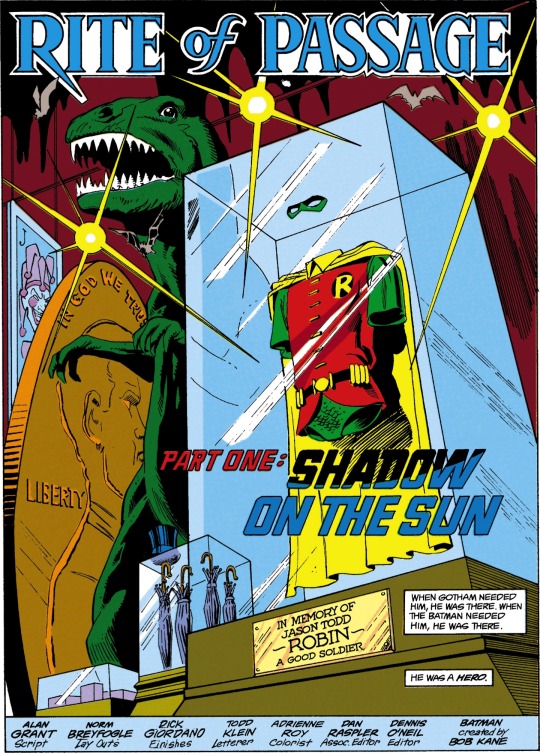
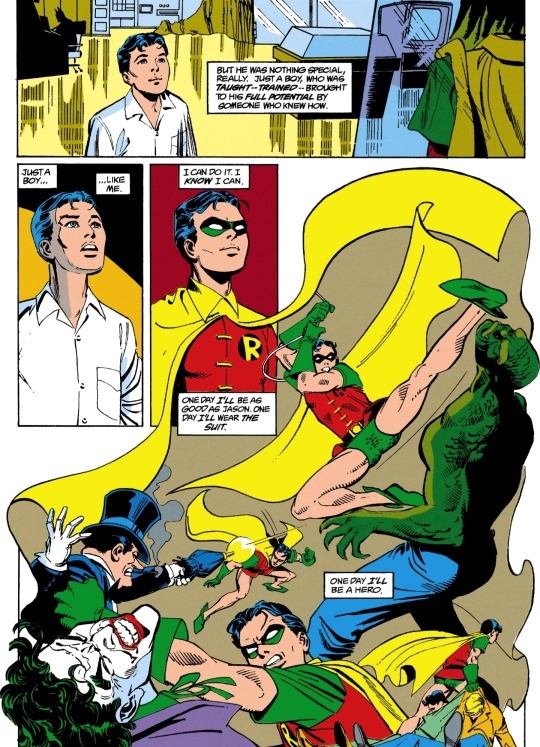
Detective Comics vol. 1 #618 (July, 1990) -- Pages 1 & 2
"When Gotham needed him, he was there. When the Batman needed him, he was there. He was a hero."
"One day, I'll be as good as Jason. One day I'll wear the suit."
To start off, we have this opening from "Rite of Passage." Tim is still in training here, mainly helping Bruce with minor stuff from the cave. His parents are off traveling, alive and well as of these next few pages. He's still bright-eyed and full of wonder. An extraordinarily weird but ultimately innocent kid.
So his view on Jason is positive and fairly simple: a hero, and someone to look up to as Robin. Clearly, Tim here doesn't think Jason was deficient in his role, either as a protector of Gotham or as Batman's trusted partner.
Moreover, Tim already held Dick in very high regard because he was amazingly skilled before he became Robin. To Tim, that's not something he'll ever be able to achieve. Meanwhile, Jason wasn't like that. He was a regular kid without crazy acrobatic training since practically birth. Yet he still went on to be a hero—which is obviously motivational for Tim who finds himself in similar shoes.
It's true that Tim only ever knew or thought of Jason as Robin, and idolized him in that regard. But that's kind of all that mattered to him at that point, because he was this kid who was utterly star-struck by his heroes. Even if he's technically aware of their shortcomings as people, it's overshadowed by the hero-worship.
It was kind of the same with Bruce as Batman at first. (Which was still enough for Tim to risk life and limb to help his beloved hero, before Bruce even knew his name.) Dick was the only one Tim had any sort of "personal" relationship with beforehand, so there is an extra level of attachment—and hence why it was the nidus for his obsession with Batman. Yet even then, it wasn't like he actually knew anything about Dick as a person until later. Until then, Tim's ideas of him were all he had, too. With Jason, Tim just didn't get to know him at any point before his return (oof), apart from what he heard over the years secondhand (also oof).
Ultimately, it's the loss of innocence—along with the ricocheting bullet that is the unresolved guilt of those around him—that begins to change Tim's perception. Not just of Jason, but of things in general.
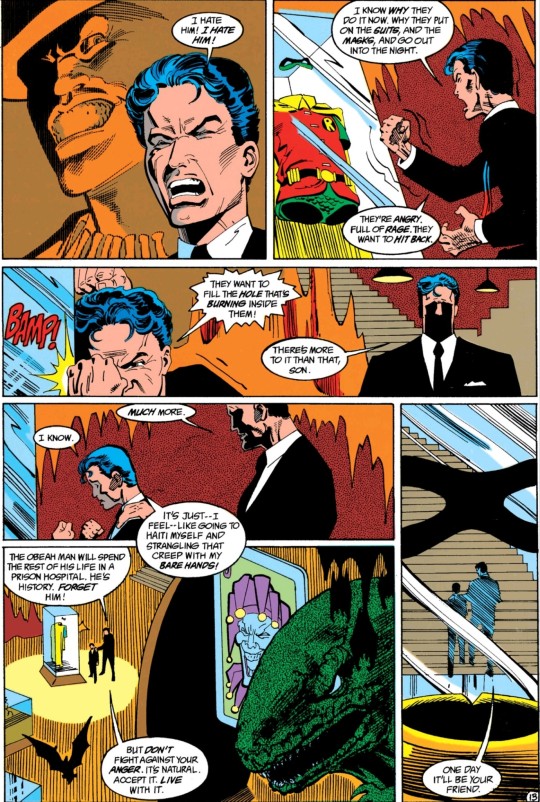
Batman vol. 1 #455 (Oct., 1990) -- Page 13
"I know why they do it now. Why they put on the suits, and the masks, and go out into the night. They're angry, they're full of rage. They want to hit back."
Losing his mother was a major shift for Tim, obviously. This is right after the previous storyline, and Tim's had the worst week or two of his life (so far). His monologue here is a reference to what happened to both Dick and Jason. The unbearable pain of loss, the rage masking the grief underneath. And importantly, that he feels both of them were justified in their anger. (And Bruce too, indirectly.)
The major theme of the aptly named "Identity Crisis" is to mirror aspects of Dick and Jason and Tim's lives—to show how they converged onto the same tragic road. It's something that Tim notices early in the story, and was frightened by. Now, horrifically, it's become a part of him as well. His parents are gone, and he was entirely helpless to do anything about it. Dick was the same way, Jason was the same way. The cycle is repeated.
In particular, the part about him wanting to go to Haiti for revenge—for his mother—sort of struck me as being an intentional parallel to Jason and Ethiopia. It's a bit of a stretch, especially in isolation, so others may see it differently (e.g. the angry ramblings of a grieving child that does sound like something anyone might say). But it always stuck out to me because of how much Tim is compared directly to Jason in this arc. More on that below.
It's not something I can really give an accurate feel of because it's a lot of subtle things that begin to add up, so I'd encourage folks to read this arc themselves to see what I mean. (Or maybe you'll still disagree which is fine too lol.) Again, many things are in reference to both Dick and Jason in relation to Tim, but it's weighted more on Jason's side.

Batman vol. 1 #455 (Oct., 1990) -- Page 18
"You think my anger will boil over, the way Jason's did. I can assure you, it won't!"
Tim's grief has begun to pull away the veil of idealism that enshrouded his heroes in his mind. It doesn't apply only to Jason, but to the rest of them. Plus add the fact that Tim's keenly aware that he's being managed, even if the adults around him are careful to not outright say certain things. He still knows.
Bruce, Dick, and Alfred are all worried about Tim potentially turning into "another Jason." They (and mainly Bruce) caution Tim to not ignore his emotions, but they're still concerned that he may be overly eager to prove himself in order to cope, and could get hurt or killed as a result. While they aren't wrong for their caution—especially at how unsettlingly similar all the circumstances are—they aren't very subtle about the elephant in the room.
Imagine how that would affect Tim's perception of his predecessor, especially when he's in the midst of a traumatic event he hasn't had time to fully process. The negative association is pretty much inevitable.
Tim's known from day one that he's walking in Jason's shadow, and now it's become inescapable. Tim went from seeing Jason as a goal to reach, to feeling that unless he surpasses him, he wasn't going to be taken seriously by anyone. However, as of this arc, Tim doesn't even fully come to that point yet.

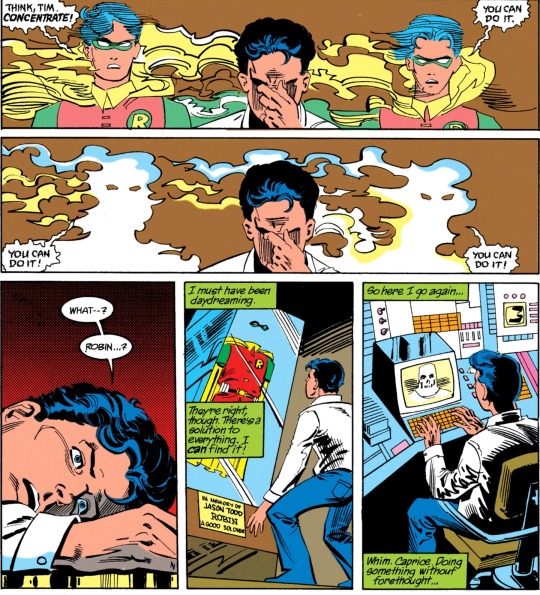
Batman vol. 1 #456 (Nov., 1990) -- Pages 14 & 15
"Drop-outs don't make it. And dead heroes are no use to anyone!"
It's really easy to take away "Tim totally thought Jason got himself killed" as the main thing here, but I think that's missing the forest for the trees.
First some context: Bruce has gone out on a mission to get Scarecrow, and expressly forbade Tim from doing any shenanigans. Meanwhile, Tim is grappling with wanting to prove himself and trying to help Bruce from the cave, all while trying to deal with his emotions. At some point, he falls asleep and ends up having like... exhaustion-grief hallucinations of Dick!Robin and Jason!Robin who confusingly caution yet encourage him. The main theme of this part is facing your fears.
Depending on how you want to interpret the intent of Jason's dialogue here, you could go several ways with it. Ranging from "writer's feelings towards Jason" to "a peek into Tim's mind as his fears manifest as visions of his heroes" or some mixture thereof.
Though Tim argues with Bruce that Batman needs a Robin, we're shown that Tim is understandably scared of joining Batman's "war." He's still not willing to let Bruce go it alone, though, and that's something he feels more strongly than his fear.
Meanwhile, hallucination!Jason's warnings are a lamentation of what happened to him in a way, but it actually exactly describes Tim's current situation even more so. Unlike Jason, Tim is under-trained, under-experienced, doesn't even have a suit of his own yet. But like Jason, he can't sit by and do nothing while someone he cares about is in danger. Tim knows that if he goes out there, he will probably get himself killed, and it will be his own fault. So he's about to disobey Batman's orders, and fly right into danger. If that got Jason killed, then Tim—who is in a way worse position experience-wise—has every chance of ending up the same.
Like... it's about Jason, but it's also about Tim. It's Tim's worst fears made manifest, via the representation of why he is even here in the first place (Jason's death).
That's my theory anyway, but perhaps this is an overly charitable reading of this scene on my end. (Not that I think that makes me wrong lol.) However given that Grant wrote both parts of this arc, and the beginning of which is especially favorable towards Jason, it certainly is something to ponder. I have a lot of thoughts on it I can't expand on here tbh but perhaps that'll be another post.
Anyway, returning to the point of the similarities vs differences between Tim and Jason: since this is the arc that solidified Tim as the next Robin in comic continuity, it makes sense that the writers really pushed the comparisons between the two of them, specifically. (Even though Dick was pretty similar, as going against Batman's orders is the Robin thing to do, it's not his shoes Tim is directly filling.) So making Tim's "debut" story arc mirror Jason's "swansong" is an obvious narrative choice.
To drive home the parallels, I wanted to include this panel from just a few pages prior to the "daydream":
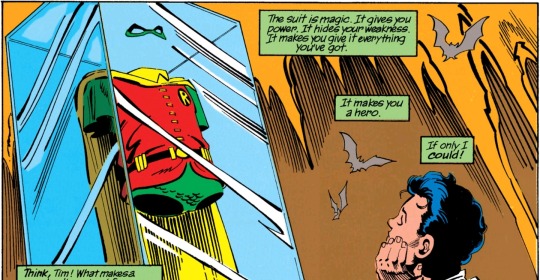
Batman vol. 1 #456 (Nov., 1990) -- Page 9
"The suit is magic."
That so distressingly close to Jason's famous "being Robin gives me magic" line (Batman #385, page 6). Given all the previous context, it's hard for me to just dismiss it as pure coincidence. Even if it is, the point still stands. Tim is shown having the some of the same heartbreakingly naive views as Jason once did, right in front of Jason's memorial, just as he's about to go and run off into the night against orders.
I think that speaks for itself. There's a lot to take away from it, if you so choose. Especially given the context of that specific Jason arc.
Alright, back to the main course:
So in the end, Tim actually goes out in civvies and a ski mask because if he fails, then at least he wouldn't bring shame to Robin's legacy™. When he gets fear gassed saving Batman, it's once again both Dick and Jason that he hallucinates encouraging him to push past his fear. (Shout out to the fact that he's literally more afraid of tarnishing the legacy of Batman & Robin than he is of dying.... I'm sure this will not be a recurring thing for him in the future.)
Tim's ideology is shown to be similar to Jason's, and the actions Tim ultimately takes are similar to Jason's... but the outcome is different. And it really isn't just "Tim succeeded where Jason failed." At least, that's not what I took away from this. Rather, Tim had no reason to succeed any more than he had to fail, just that he did. Luck combined with caution because he knew what happened to his predecessor, and the fact that Batman was there to finish the job all made the difference.
You could say (and I know some will) that it's just classic Jason character assassination and the writers trying to implore readers that this new kid is different we promise pls don't hate us look how much better he is! But in this case, that feels like it undermines the whole point of this story. It doesn't fit with what the characters actually say.
Thus, we return to the question of how Tim felt towards his predecessor. And the answer is different from where we started, because Tim is different. Not that different though. Because even though at this point Tim—like all the adults around him—has probably attributed Jason "going off on his own" being what led to his death, Tim still thought of him as a hero to look up to. It's about Robin, first and foremost, yes. But Tim is fully aware of the people who made that suit mean what it does, because it's all intertwined.
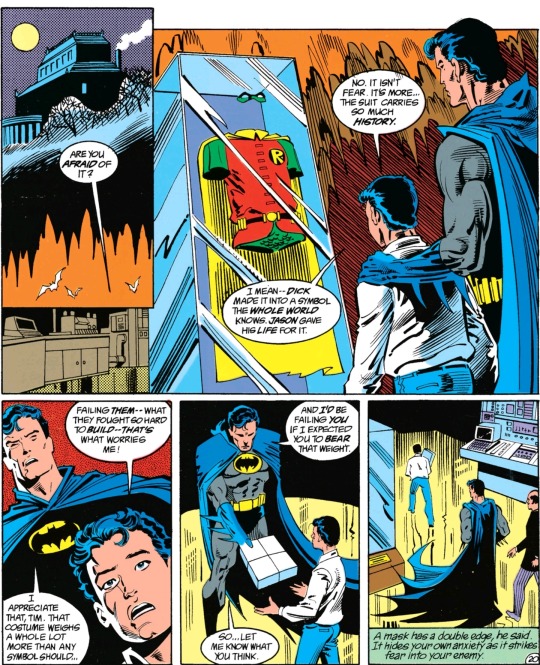
Batman vol. 1 #457 (Dec., 1990) -- Page 20
"I mean--Dick made it into a symbol the whole world knows. Jason gave his life for it."
Even further, Tim thinks of it in terms of Jason having given his life for what he believed in, for the legacy that now falls to Tim. There's a sense of gravitas there. He's afraid of failing both the Robins who came before him.
Ultimately do I think Tim adored and loved Jason on the same level as Dick or something? No. It's not comparable. (Dick was like part of some of Tim's earliest memories and everything! They have a really unique bond ok.) Yet Tim was also far from thinking poorly of Jason so early on. Frankly, it seems that Tim thought of Jason as a noble hero and a cautionary tale. Yes he took risks and sometimes went too far, generally stuff that Tim doesn't want to repeat and all that. At the same time, Tim still saw him as someone whose legacy and memory was worth honoring.
It's complicated, which is why I like it so much—because it feels real. Having conflicting feelings towards someone is... so human. Especially someone you never got to know, yet who plays such an integral role in your life via the shadow of their death. How can you feel anything but complicated towards them?
It has to be said that, yes, Tim's views—even before Jason's return—change over the years. He becomes more jaded as a person and is surrounded by people who are even more jaded than him... and who often mention Jason as the "failed Robin." It's something that's hung over Tim's head all the damn time. The curse of the Robin mantle.
So it shouldn't come as a surprise that Tim's idea of him becomes more akin to "sounds like a skill issue" as the years go by. All bets are off after Jason's return, and the Titans Tower Incident™. At that point it's firmly "I am better than you, loser" lmao.
And... that's all without getting too into things like authorial intent and general "moods" of different DC writers towards Jason at a given point. Or retcons that played a role in his characterization and how other characters talk about him, depending on what "era" you're reading. That's way beyond the scope of this post though!
TLDR; even though young Tim Drake was obsessed with Dick Grayson as Robin, he still looked up to Jason Todd as well. He didn't think of Jason as a cringefail loser until later. :)
(image dialogue transcripts under cut ↓)
Dialogue Transcript for Image 1 (Detective Comics vol. 1 #618 -- Page 1):
Narration box (Tim): When Gotham needed him, he was there. When the Batman needed him, he was there. He was a hero.
Dialogue Transcript for Image 2 (Detective Comics vol. 1 #618 -- Page 2):
(Scene continued from previous page)
Narration box: But he was nothing special, really. Just a boy, who was taught--trained--brought to his full potential by someone who knew how. Just a boy... like me. I know I can do it. I know I can. One day I'll be as good as Jason. One day I'll wear the suit. One day I'll be a hero.
Dialogue Transcript for Image 3 (Batman vol. 1 #455 -- Page 13):
Tim: I hate him! I hate him! I know why they do it now. Why they put on the suits, and the masks, and go out into the night. They're angry. Full of rage. They want to hit back. They want to fill the hole that's burning inside them.
Bruce: There's more to it than that, son. Much more.
Tim: I know. It's just--I feel--like going to Haiti myself and strangling that creep with my bare hands!
Bruce: The Obeah Man will spend the rest of his life in a prison hospital. He's history. Forget him! But don't fight against your anger. It's natural. Accept it. Live with it. One day it'll be your friend.
Dialogue Transcript for Image 4 (Batman vol. 1 #455 -- Panels from page 18):
Tim: Because you think my mother's death has upset me too much. Well, it did. But I've taken your words to heart. I can cope. You think my anger will boil over, the way Jason's did. I can assure you, it won't. But that doesn't make any difference, does it? Why can't you have a little faith in me?
Dialogue Transcript for Image 5 (Batman vol. 1 #456 -- Page 14):
Narration box (Tim): Blast it! My head's starting to swim. I'm about ready to give up. I almost wish I'd never heard of Batman and Robin!
Vision Dick: Heroes never give up, Tim.
Vision Jason: You know that.
Tim: Dick--! Jason Todd!
Vision Dick: You're training to fight in a war, Tim. It'll last all your life. No matter what, you have to go on fighting.
Vision Jason: Drop-outs don't make it. And dead heroes are no use to anyone! I thought I knew better than Batman. I thought I could run before I could walk. I killed myself, Tim. Because I couldn't wait. Because I couldn't think it through.
Dialogue Transcript for Image 6 (Batman vol. 1 #456 -- Page 15):
(Scene continued from previous page)
Vision Dick: Think, Tim. Concentrate!
Vision Jason: You can do it.
Both: You can do it!
Tim, waking up: What--? Robin...?
Narration box (Tim): I must have been daydreaming. They're right, though. There's a solution to everything. I can find it! So here I go again... Whim. Caprice. Doing something without forethought.
Dialogue Transcript for Image 7 (Batman vol. 1 #456 -- Panel from page 9):
Narration box (Tim): The suit is magic. It gives you power. It hides your weakness. It makes you give it everything you've got. It makes you a hero. If only I could!
Dialogue Transcript for Image 8 (Batman vol. 1 #457 -- Page 20):
Bruce: Are you afraid of it?
Tim: No. It isn't fear. It's more... the suit carries so much history. I mean--Dick made it into a symbol the whole world knows. Jason gave his life for it. Failing them--what they fought so hard to build--that's what worries me!
Bruce: I appreciate that, Tim. That costume weighs a whole lot more than any symbol should... and I'd be failing you if I expected you to bear that weight. So... let me know what you think.
Narration box: A mask has a double edged, he said. It hides your own anxiety as it strikes fear into your enemy.
#tim drake#jason todd#dcu#dc comcis#batfamily#meta#I'm so sorry this post got out of hand fr#it was meant to be a quick drabble with some comic panels and instead i just...... kept going#this post is specifically for my one (1) bestie who cares and the like 2 ppl who might be as insane as me about Timmy#idk why I'm like this im just obsessed with Tim's relationship with early Batfam & co lately???#late 80 and early 90s comics my beloveds......#anyway if this gets more than 5 notes i'll be shocked and scared lol#nyerus.txt#text post#long post
538 notes
·
View notes
Text
Are We Returning To 2000s Era Shonen Anime/Manga (A Discussion)
So this is going to be way more of a thinkpiece than I usually do for this blog, but recent trends in the space and niche that I devote a lot of time to, Anime/Manga, have been showing themselves that got me thinking. This is not meant to be a serious sociology case study taken as fact, it's going to be more a theory based on observations of the community that I, like many others, devote a lot of time into than a full on claim, but I do want to ask, is the anime and manga community is experiencing a resurgence in 2000s era shonen manga?
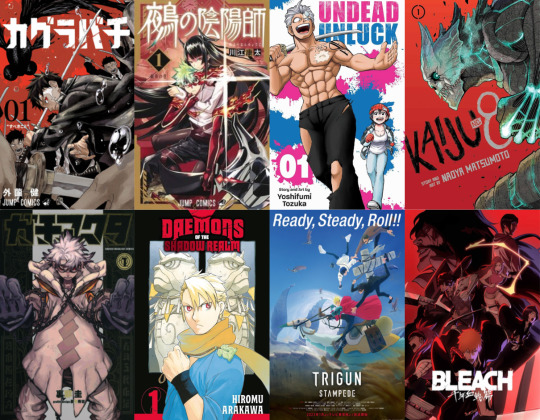
Background
Now let me get this out of the way, there is bias in these observations as I am a western anime fan, but also a North American anime fan. Meaning my gateway and gauges of pop culture are mostly determined by the history of my area of the world’s relationship with anime. From the OVAs of 80s hyper violent and hyper sexual sci fi that you had to purchase from the backs of video rental stores, to the Toonami era of 90s and early 00s programming block the centred around action anime and cartoons, the 4kids era of mass market japanese animated kids shows that were really just giant commercials with some of the earliest memetics in western sphere, and the explosion of shonen battle series in the western sphere in the mid to late 2000s marked by the rise of the colloquially named “Big 3” of shonen jump.
I understand that continents like South America or Europe may have undergone a different exposure to the Japanese medium, but as I am going in with some bias in this observation, I would like to make it clear on where the formula is coming from.
I also would like to lay down a certain clarification before making this, when discussing the topic of nostalgia I think a lot of people have forgotten what it actually means. If we go by the Cambridge dictionary definition, Nostalgia is “a feeling of pleasure and also slight sadness when you think about things that happened in the past.” This is often invoked when talking about pop culture because people from say 20 years ago don’t seem to enjoy or relate to the interests of today. The belief is that nostalgia is generational ergo if you grew up in the 80s you’re likely wishing to recapture the feelings of childhood that you associate with those trends from 20 years ago. In fact, most revaluation in media has often been catalyzed by a difference of those who grew up in an era rebuffing the opinions of those who didn’t.
There is the well known “20 Year Rule” regarding pop culture nostalgia. That every decade it longs for what was popular 20 years ago. Probably no better example than “That 70s show” being popular in the late 90s, the return of many beloved 80s-90s franchises like “Ghostbusters” returning in the 2010s as well as series like “Stranger Things” that wrapped itself up in 80s aesthetics. DC's New 52 relaunch that seemed to bring back trends from 90s era comics.
Now it goes without saying that the 20 year rule isn’t a “real” rule, rather an observation that certain trends make a return to popularity because the ones who grew up with a certain media will be the ones who add to the discourse when they come of age and will be the ones having a chance to create consumable art for the masses and that may just be revivals of once popular IP. This isn’t necessarily wrong in regards to nostalgia, but I do believe that one doesn’t need to have been born in a certain era to be nostalgic for something when we discuss pop culture. Pop culture is really just trends and preferences that become en vogue and people can acquire a taste at any given time. Sometimes it can be due to those who grew up with something now having the chance to create and drawing upon their own childhoods, sometimes it's just due to not being exposed, other times it can be a certain feeling of disillusionment of the now, and seeking something that peaks your interest, and even sometimes it can be major corporations or networks looking for things with existing audiences to draw upon that actually expand the audience. In fact one of the most prominent Netflix adaptations of the 2020s has been live Action Avatar the Last Airbender and One Piece, both shows that got their start on American televisions in 2004 and 2005. One of the biggest animated shows right now is Invincible, based on a comic book from 2003
So I want to stress this is not necessarily about how if you grew up with the original Mobile Suit Gundam show you are being replaced by the kids who were watching GetBackers. And or if you are a fan of shows that came out in the 2000s you yourself were born in the 2000s.
But what was the landscape of the English speaking anime community like back in the 2000s? Well let me paint a portrait for you.
What was the 2000s like for anime fans?
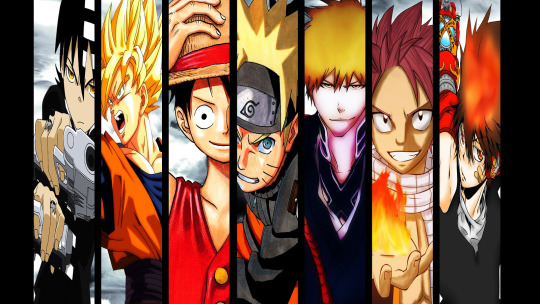
The term I used, “shonen boom period”, is somewhat mythologized in the western anime sphere. There was a glut of high profile shonen anime running around the same time that most people identified with this time period and was arguably when we saw the most influx of people getting into the hobby. One Piece, Naruto, and Bleach served as big series known for their massively large casts, MCs with a level of attitude, some of the most hype centric power supernatural/extraordinary power systems, and certain brand of “Japanese-y” humor.
We can’t deny that it wasn’t just these series however, as series like Fullmetal Alchemist became many people’s introduction to more narratively intricate series interspersed with a somewhat gothic action style. The gothic and somewhat edgy Death Note became many fans' first ever “battle series that’s not a battle series” that also incorporated many biblical and gothic horror elements into its presentation. And things like Code Geass also incorporated this combination of hyper stylized cat and mouse with ornate and gothic aesthetics and fighting robots.
Series like Ouran Highschool Host Club and and Haruhi Suzumiya were basically gateways to the more hyper extraordinary slice of life series that didn’t shy away from fanservice and loud comedy. With ecchi like Rosario + Vampire taking it to an even greater extreme. For people willing to go even deeper, series like Fairy Tail began to pop up and share a distinct similar flavor to series like One Piece and Naruto which arguably started the popular conception of it coming from the same magazine as the latter. That’s not also discounting the amount of holdovers from the 90s like Dragon Ball z, Trigun, and Yu Yu Hakusho, which also had an edge towards fantastical combat and comedic oriented series.
All of this is to generally illustrate the media diet of what an average anime fan was expected to have some level of access to. As this was far before the eras of Funimation or Hulu having online services. Not a homogenized spread by any means, and im certain plenty of readers could name more underground or smaller series like Mushishi or Elphen Lied, but generally the popular mainstream you could tell that there was a consistent theme of long form media with a very loud, very flashy, and very action oriented type of series. Which I think is fair to say had skewed some people’s perception. And while I cannot claim with utter certainty that Japan was the same in this regard, you can look at magazines like Shonen Jump and notice a somewhat synchronistic trend. With series like Hitman Reborn, Gintama, D. Gray Man, Eyeshield 21, Bobobobo, etc.making a clear marcation of what was commercially successful at the time.
Even series not inside the magazine but had smaller nicher, Tokyo-pop-esque series like Rave Master, Flame of Recca, Air Gear, History’s Strongest Disciple Kenichi, Soul Eater, etc all had a similarity to the shonen jump magazine. To the point it was not uncommon to see so many jump characters in a collage and one from shonen sunday or shonen magazine in there as if this was all coming from the same place.
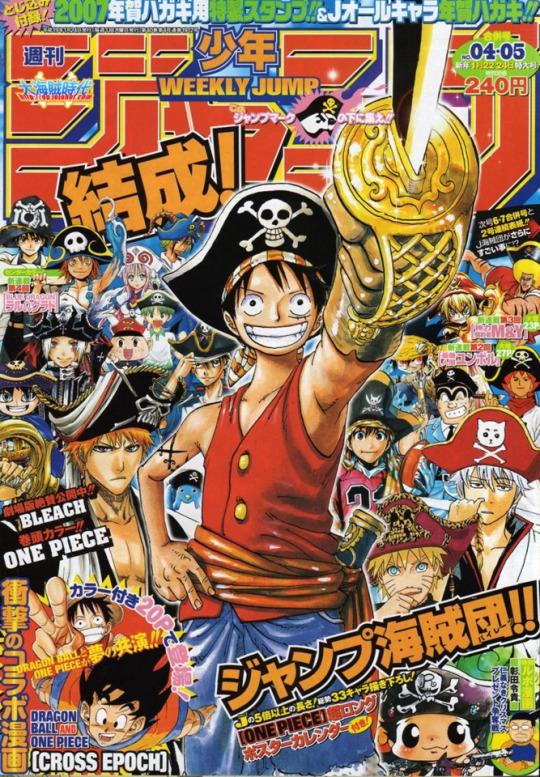
Changing Landscape
Now with the advantages of the modern internet, we have the ability to actually keep up with the jump magazine in real time as opposed to the common practice of relying on scanlation site and fansubs that were often devoted to the most popular works. But with simultaneous publication and services like Crunchyroll, being able to access a wider variety of shows and series that we may or may not have access to. I believe that the 2010s in the english speaking fanbase was the decade we saw a somewhat expansionism of what people perceived as anime. Anime could be One Piece and Naruto, but it could also be Erased, it could be the Promised Neverland, Attack on Titan, K-On, Haikuu, and Durarara. With the representatives of the 90s no longer being holdovers in syndication like dragon ball but rather full on revivals of the likes of Jojo’s Bizarre Adventure and Hunter x Hunter.

All of these could be "shonen" but also other genres like Seinin, Josei, and Shojo all had their own varying layers of what they could be in their demographic
The mood of what was popular was also changing, not just in the fact that more flavors of anime and manga were becoming mainstream, but new works from shonen jump showed a rise in almost subversive series like My Hero Academia and Demon Slayer that seemed to consciously deviate or place new spins from traditional tropes of the 2000s characters, and we saw works that were derivative of previous serious like Black Clover drawing upon Naruto the same way it was known that Naruto had drawn upon Dragon Ball before them. Series like The Promised Neverland and Doctor Stone offered up more dramatic series that still infused a certain energy of the shonen genre.
And of course the series like Attack Titan whose much more darker and gorey storytelling seemed to have become one of if not the biggest hit of the generation with a well regarded adaptation, but something that had felt so removed from what were once contemporaries like the then ending Bleach or Naruto. We can also note that the late 2010s saw the rise of series like Chainsaw Man and Jujutsu Kaisen that began a trend of popular urban fantasy stories. Where fantastical concepts were now in contemporary Japan and the stories that focused on concepts like self identity and the harshness of maturing were juxtaposed to the real world inhabited by monsters.
It seemed many tropes of the previous decade were still alive in the rise of Isekai anime. Which was particularly the only popular outlet for fantasy stories with an action orientation. But these almost felt disconnected from the wider world of manga as things like heavy harem action series had actually decreased in mags like shonen jump. There was also new tropes being established in this subgenre that became unique popularizations of tropes all on their own, such as the overpowered protagonist whose power everyone believes is weak. But many of these were based on light novels, a form of media that only in the last few years western readers are having official access to and not simply scans found on the internet.
We in North America truly have gone from anime being a niche that was primarily accessible through dedicated TV blocks like Toonami, to a full blown cultural relevance shift.
We also need to talk about this era in its perception of the past also shifted. The 90s and the early 00s often blend together as classics of the anime community. Somewhat encased in amber. However, there is no denying that “feels like a 2000s series” had become a bit of a shorthand for very goofy, Very horny, very action heavy series. Series like Fire Force and and Undead Unluck had their show what more problematic elements be equated to the problematic trends of the past that people just accepted as “a part of the medium.” But lets keep in mind, this is not really describing a time, more a trend. Superficial elements that invoke similar feelings of the past.
Speaking of anime fans…
Fan Culture
So while I wanted to paint a picture of creatively the landscape has changed, there’s no denying that in the age of internet accessibility, the anime fan community has also changed. It is much much easier now to get in contact with people who are anime fans now than it was to rely on word of mouth like it was back in the day. I can still distinctly remember my anime club which wasn’t even really a club devoted to anime but rather other geek stuff like D&D and TCGs. Our hobbies just happened to have similar overlap.
Now though, anime fan culture is much more relevant and thriving. Going from just posting weekly reviews, to long retrospectives, comedy videos, abridged series, clickbait articles, fan theories, and podcasts. However, I think a defining feature of fans of the 2000s era of anime that were at their most prominent was hype culture.
Due to many of the biggest anime series at the time being released weekly and focusing on action, many many many discussion boards and videos were often about staying in this cycle of wanting to see what happens next and the action made people very excited to see just how characters were going to win fights or even if they’d have fights at all.
I want to make it clear that this type of activity doesn’t belong to a certain era, but you can see it shaped by the 2000s era. Especially when discussing “what is the next big 3.” As if it were a true position and title, rather than a moment in time where there were just three very distinct shonen series in the fanbase.This doesn’t necessarily have a “negative” effect on the discussion of anime/manga but you can see that certain genres lend themselves to hyping fans up more and more.
Someone isn’t reading the most recent chapter of a romance like Blue Box with the same level of anticipation of who will face who like it was One Piece. But there have certainly been series that try.
The Present
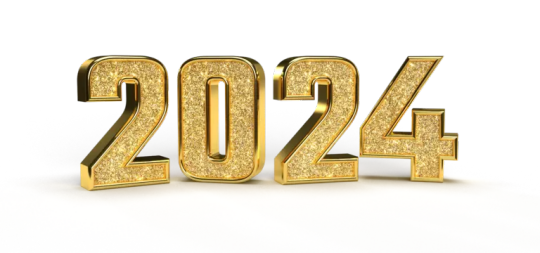
Now we reach the 2020s and this decade is still young, so it is hard to say what the future will hold for certainty, but we can look at the last four years and notice some significant waves being made recently in Shonen Jump alone. I already spoke of Undead Unluck, a series that almost wears it would now be considered retro inspirations on its sleeve. With an opening chapter that establishes an MC that seems motivated by a sexual joke, A power system follows a verbal naming gimmick, and a loose enough world that allows for characters of varying aesthetics and to be incorporated into groups. With groups of these powerful characters splitting up to face each other and use their ridiculous power to the extreme. Even in the series' own meta arc about creating manga, the in-universe analogy for Undead Unluck’s manga is commented on as feeling retro.
There is no doubt the biggest viral hit of the decade so far has gone to Kagurabachi, a manga about sword fighting and magical crime lords that seems almost indulgent in its stylistic slicing and or dicing of baddies. Its memetic success was primarily due to a somewhat sincere and somewhat ironic belief that it would be the “next big thing” as it promised to be a stylized action series. Another surprise viral success has been the manga Nue’s Exorcist which sees another supernatural swordfighter boy harness the powers of his sexy spirit lady while getting into harem shenanigans that echo a particular form of ecchi of anime’s past that had actually been somewhat absent in the past decade in jump. Both of these series have a somewhat noticeable similarities to Bleach, a long running shonen action series that has seen its own revival in the last few years of writing this with the long awaited adaptation of the final arc of the bleach anime.
While the other members of the “big 3” never truly went away and became almost inter-generational, Bleach truly did feel like a “come back” as it was absent for so long. And unlike Hunter x Hunter and Jojo which were never really popular in the west and even their older anime are more regarded as anime deep lore. Bleach was one of the most popular series in the west at the time to never receive a conclusion animated.
Speaking of anime of the 2000s Trigun Stampede was a reimagining of the original late 90s show. This errs a bit similar to Hunter x Hunter’s style of revival, but also seems uniquely its own in actually trying to find a balance between the original series but adding in things cut from its original late 90s early 2000s counterpart.
And now we must examine other shonen magazines. Series like Gachiakuta created by a former assistant of Okubo, the creator of Soul Eater, carries with it much of the similar energies of that series. Its also noticeable as being a truly dark fantasy series. Not an urban fantasy, but rather a completely new world that had a very grunge and dirty world building. And then there is Daemons of the Shadow Realm, a series by Fullmetal Alchemist creator Hiromu Arakawa. This series is also set in modern day japan with supernatural elements, however Arakawa’s style of writing is practically unchanged from her time on FMA. With an emphasis on action, intricate mysteries, and character building comedy with her trademark over exaggerated blocky style. There is of course Hiro Mashima who has started another new series, Dead Rock, and his style has also not changed that much. Then there is just flat out sequels to 2000s series like Gamaran Shura.
This to me shows that we are seeing a bit of a combination of people who are now entering the workforce inspired by creators of the past, but also that creators of the past still exist 20 years later and are still making content that hasn’t really undergone significant change.
Of course, we can’t also forget the implementation of the Manga Plus/J plus service which has opened up a very interesting ground for creators to have some of the most creatively out there series than what you may have expected from the shonen jump brand. I genuinely don’t think series like Make the Exorcist Fall in Love or Fire Punch would’ve ever been acceptable in the pages of a weekly shonen series. However one series in particular does feel like it could've and boy its been quite the success. Kaiju no 8.
Kaiju no 8 almost feels as though it is the AoT of a new generation with the amount of anticipation this one series has as well as the similarities between the series superficial elements. However, I'd say the key distinction between the two has been the tone. AoT took a dark and practically dour tone on its titan infested world. With an MC declaring war on all of his enemies. The pain was realistic, with human bodies being brittle and vulnerable. And the belief that just because you were a good person you weren't going to make it out alive. Kaiju no 8 instead opts for a more action oriented tone. Down playing the bleak realism for more "Hell yeah!" moments. With super science weapons that feel more akin to a tokusatsu show and fights and battles between humans an kanji the feel like the Dragon Ball style wrestling matches of old.
And of course, that’s not to say Jump hasn’t continued with series that feel more modern like the realistic and mellow romance of Blue Box or the dramatic coming of age story of Akane-Banashi.
But the presence of these series has caused somewhat of a friction with the popular conception of the magazine. Its safe to say that while “shonen” tends to think of action male oriented series, it can really just mean works aimed more at adolescents. But I think many tend to associate this familiar feeling of “what is shonen” with their popular introduction of the magazine. With a saturation of action and brash comedy series. This is further complicated by the fact many action series in jump are actually ending over the last decade. With new ones not popping up to replace them as frequently and series like One Piece and MHA and Black Clover basically stretching out across an entire decade or longer.
In fact, I don’t think it's unreasonable to believe that the hype for something like Kagurabachi was in part a belief that it signaled a return of a type of familiar series and genre that had been missing. Or at the very least, looked to fill an inevitable gap the magazine was obviously going to be facing. Followed by the other commercial success of Nue’s Exorcist, we are likely to see these series last for a long time. At the time of this writing, Tokyo Revenger’s author Ken Wakui has released Astro Royale, a series that feels very similar to his previous work yet infused with this almost GetBackers flavor.
So that leaves us with the question at the start, are we seeing a rise in 2000s nostalgia in anime and manga?
Conclusion
So I'm sorry if I disappoint, but the best I can say is, I’m not certain. I do believe that from my observation I think it is reasonable to say that we are seeing a rise in creators in the shonen space being ones inspired by series from 20 years ago. However, I think we are also seeing creators who are from that time period also returning to write how they have always written.
On the consumer side, I think we can see that fans of anime and manga have changed in the sense their tastes can now be shaped by a much larger catalog of series at their disposal. But in the case of shonen, I think we are simply seeing those who likely got their start in anime at around the 2000s resonating with newer series drawing upon those series, but also with younger fans now likely to grow up with the tail end of what was popular in the 2010s now being influenced by the 2020s.
I also believe that one of the defining features of the anime community in the last decade is hype culture. And currently we are seeing a rise in series that actually feel more catered to hype, be it a revival of a series they liked or predicting what will be the next success.
All and all, this piece was trying to tunnel on the shonen demographic in general, which is more likely than not going to have similar traits relative to itself. I do see us as a community endorsing trends of the past and there’s an excitement for these things to “come back” even if they may or may not have left.
If you liked this please drop a like or reblog because I may do more of these think pieces in the future.
#anime#manga#think piece#discussion#shonen#shonen jump#kagurabachi#gachiakuta#nue's exorcist#undead unluck#kaiju no. 8#bleach#one piece#naruto#yomi no tsugai#attack on titan
44 notes
·
View notes
Text

"How Much More Star Wars Do We Need" Need? Need? It's a fucking entertainment product, we don't need any of it. If It's bad, don't watch it (being upset about the politics or disappointed because you really wanted it to be good a different issue). If it's good, but you don't give a shit- don't watch it either. There are so many blockbuster movies I never watch! Because they don't interest me. While I'll read every week's new Star Wars comic issue.
The reason why Thrawn is such a beloved character is because there were people who wanted more Star Wars in the late 80s early 90s and read the books that were coming out while the general public never heard of them. In reality, the tv shows aren't creating a sizable increase in Star Wars since the EU really got going at the start of the 21st century.
Yes the reason Disney is making these shows is because of money, and it probably isn't the best allocation of resources for everyone's collective enjoyment (especially when its live action. Your scifi fantasy can be cheaper and look better in animation). But if there's too much of something, you don't have to watch it all.
Disclaimer: I haven't watched the video because I didn't want to get angry for half an hour because I rejected the premise. If Gooden is making a different point, my bad. But this is just a general rant about people acting like there's too much Star Wars while not acknowledging anything other than live action, set of by the specific use of the word need.
6 notes
·
View notes
Text
the specific flavor of roydick when they were queercoded, or at least--i mean theres *at least* a *strong* argument that they are, starting around... maybe devins arsenal mini through titans 99, but *definitely* outsiders all the way through roy leaving the team. but like, they're simultaneously queercoded and maintaining that very late 90s/early to mid aughts-specific heteronormativity yk. a swell couple in an erotic butch and sundance kind of way
(and i mean we do know devin in particular was writing with bi dickie in mind, shes gone on record on that, but like specifically roy and dick in relation to each other...)
and im just. thinking about this because in my beloved The Cheshire Contract in the *80s* they are not actually queercoded, the homoeroticism was just. two bros gettin naked in the same hotel room, being touchy feely bros hetero style... idk man theyre really affectionate with each other in it! but then by the time graduation day rolls around you can't even picture them that comfortable touching each other despite like. still being written as... i mean they're close, you know? *close.*
but they don't touch anymore.
and like thinking about. by contrast. my beloved outsiders #11 where. dkdkckflf. god. grace's famous you boys would make a swell couple in an erotic butch and sundance kind of way quote, roy cuts her off with a kiss, they have sex, and-- god im sorry please just read outsiders v3 because this issue is. insane. anyway then dick and roy have what *eye* would argue is a sexually charged sparring scene, particularly bc of the way it was juxtaposed with roy and grace. and it ends when dick pulls a fucking gun on roy *as an expression of care.* like explicitly that's why he's doing it. like oh my god! the rituals are so fucking intricate!
and like FIVE ISSUES LATER they have this massive blowout fight and-- fkflflfm.
the point is. the point is. my last reblog was about fictional male intimacy needing violence as a pretext. and i was thinking about the specific flavor of heteronormativity at the time and. weighing in my mind whether my beloved outsiders 11 or my beloved action comics 613-618 feels more intimate. thinking about the heteronormativity flavor of, these two guys can't be physically affectionate bc of it vs the flavor where they *can* be physically affectionate precisely *because* heteronormativity means it wouldn't be gay if they did. and i think its not quite a fair comparison bc i do believe the point of outsiders 11 *was* the intimacy, compared to the cheshire contract where it was an easy comfortable byproduct of their friendship. but, well! there most certainly is violence as a pretext, huh?
much to think about.
#one of my favorite issues of outsiders after 11 obviously. is the one where#anissa (iirc) says the quiet part loud and compares whats happening to John carpenters the thing#which is such a like... on the nose description of the *entire outsiders run* i love it so much#like outsiders is a little... its nowhere near as solid craftwise as winicks even longer-running run on GA#which is partly bc hester and parks were so solid and consistent that whole time vs the outsiders artists who... 😬#i mean im even thinking of it had karl kershel on one issue whose art i normally really *like* but it was so lackluster in outsiders & not+#just because it was ill-suited stylistically. the inks or colors or something i can never put my finger on it#...... where was i going with this.#i think mostly just i think winick does some very interesting things exploring masculinity in outsiders#and its a shame that he didnt have a solid team to work with that whole run#mostly for me. like it sucks to be like this book Changed me and then show you one of the ugliest drawings uve ever seen#(and. so many of the artists. did *not* understand grace is supposed to be butch dkdjfjdn)#and yk the editing was. not as good like even putting the art aside it just wasnt as tight#anyway.#dc
3 notes
·
View notes
Note
As a longfic writer, I can see the *how*, where you wrote the fic for that happy ending, and fatigue is setting in, and you just wanna. Dump everyone in roses without plucking the thorns. I'm willing to fandom-pass that. *My* line is contradicting one's own premise. Friend is the one who cares! Friend ditches you in a nightclub bc it's twu wuv! Career defines us! Epilogue quits job to have baby herd. Expert now incompetent in own field! AND they have betas complicit in it. That's not on. 1 /2
Yeah those are always infuriating. Sometimes when I see a fic like that and I'm like... is this a me thing, a trends in this fandom thing, or a this particular text thing is I scrub all fandom specific details and have my rant with a friend not in the same fandom and see if it hits them the same.
This got stupidly long so cut
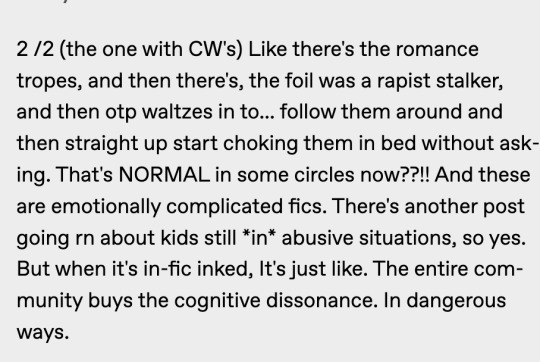
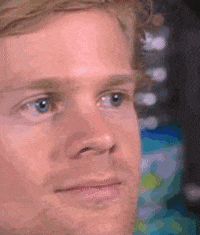
So I'm not familiar with your example or the post, but if that's a new fandom trope re: an in canon rapist stalker, for me personally, if tagged appropriately, I'd fall under YKINMKATO, but it is seriously NMK. If untagged, I'd be side-eyeing hard. I realize that might not be where you fall at all, but regardless of my personal taste re: a fic or trend in fics, I am generally going to take most arguments about the dangerousness of individual fiction tropes (that are not based in marginalization, etc) with a pillar of salt. I don't know why that narrative is resonating with members of that fandom, but it is. If they're tagging it so that people know what they're getting...I wouldn't read it but I'm not going to be mad about them reading it, if that makes sense.
I sort of riffed off of some of what you mentioned up there but as a disclaimer I'm sort of thinking about big fandom trends and not so much talking about you but patterns lately that as a fandom quasi-old have been on my mind the past decade or so.
I'm always going to be super leery of the 'unlike myself, the feeble minded masses know not the effects of what they read and must be protected' slippery slope. It was a bad argument in the Middle Ages, when it was used to make vernacular literacy illegal, continued to be a bad argument in the 18th and 19thc when it argued that women and children were too weak-minded to read without mental and moral damage, and looks real familiar today in discussions about fanfic in particular but we see it in other moral panics of the 80s, 90s, and aughts, re: video games, rap, rock and roll in the 80s, etc.
anyway.
For me, the tagging is a key courtesy but while that fic arc might make me X out... that's kind of it for me. I am not then going to say that it is dangerous for other people to read it and assume that I see the "problem" but they don't or that if they have cognitive dissonance, it's one they can't think through. They might enjoy it as fiction and also see that it's not a thing they'd want in real life, much like... most of what we consume in media.
One thing that complicates a lot of this further is that there often are ... in-fandom givens that newcomers or people outside judge very differently and which consequently don't port well to other fandoms.
So for example, in Marvel comics fandom, identity porn is extremely common because of all the secret identity in early comics, and that's a sort of beloved aspect in a lot of those fandoms and comics. Friends who write and move into other fandoms report back that similar storylines in other fandoms get flamed if they don't get tagged to high hell for noncon and dubcon bc of the identity issues, which... at least when I was more heavily reading in comics fandom... just wasn't an issue because of the givens of the content matter, but ... that's not a portable assumption when you leave those confines.
idk, but I think a lot of times we tend to take more complicated issues of personal response and also issues of what makes some narratives, characters and fandoms attractive to people at certain times to people and reduce it to the same reductive good/bad, healthy/unhealthy, etc. binarisms that are great for setting up false dichotomies of us/them, but not great for conversations or even just saying yeah that's not my thing and I don't get why it's yours but how about that rich tapestry of life, eh?
I think part of what we're seeing right now is the loss of insular fandom community and communities with internal vocabularies and shared norms colliding with an overall cultural hard swing into paternalistic and fascistic discourses about sexual and moral purity that means that often we see a necessary conflict where there is a difference of opinion.
Meanwhile we have people actually framing true dehumanization and violence as a difference of opinion. I just think we've got our polarities and priorities flipped on a lot of this, probably largely because we're super anxious and feel powerless about our ability to effect change in the big picture issues right now, so there's a lot of punching across and down so we can at least feel like we're winning some kind of victories, but... I think when we do that we're just kind of playing into the big picture on the wrong side a lot of the time.
tl;dr totally agree that self-contradictory fics are obnoxious, and that sometimes fandom narrative tics can squick me, but I'm suuuper leery of labeling them dangerous even if they make me say oh hell no.
6 notes
·
View notes